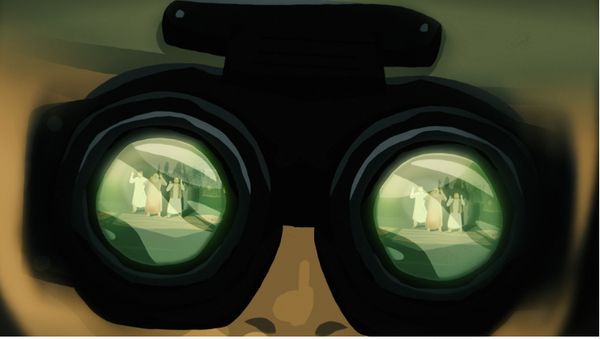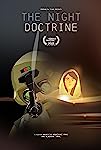Eye For Film >> Movies >> The Night Doctrine (2023) Film Review
The Night Doctrine
Reviewed by: Jennie Kermode

Lynzy Billing lost her mother and sister in a night raid when she was just two years old. Her father died soon afterwards, in the fighting. Adopted by a loving British family who moved to Israel, she would subsequently become a journalist and return to her birth country, Afghanistan to try to document the number of people killed in such raids. Mauricio Rodriguez-Pons and Almudena Toral’s short documentary tells the story of her quest.
It’s not easy to film in Afghanistan these days, and some of what Billing addresses would be difficult to reconstruct. Instead, the film is mostly comprised of animation, fluid and sometimes blurry, in keeping with the fuzziness of memory and the need for some of those involved to remain anonymous. It opens with a reconstruction of a raid from a young child’s point of view: the sudden noises in the night interrupting sleep, glaring lights as armed strangers come crashing through the door, parents startled and desperate. Billing reflects on the psychological effect of living with the awareness that such an incident can happen at any time, without warning – just when one is at one’s most vulnerable. It was, she suggests, a deliberate strategy on the part of those responsible: the Americans, the CIA.
It was supposed to be about hunting terrorists. Although she doesn’t provide any data to back up the assertion that it made more of them, that’s not difficult to believe. Those it happened to have been left without answers, struggling to process their grief in the absence of any closure. Billing meets a widow who lost two of her sons with no explanation. Everyone in Afghanistan shares this pain, she says. As far as they can tell, there is simply no accountability.
Many of the raids were carried out by Afghan soldiers following US orders. She speaks with two of them, anonymously, about the night they realised that the four young people they had just killed were nothing to do with the Taliban. They, too, carry a burden of grief.
The animations give way to film at the end; having heard the stories, we see faces, emphasising that this happened to real people. The insulating effect of soft outlines and blurred colours is removed. Billing's story does not have a neat ending, but given the context, that seems appropriate. This is not a film which condemns the US as a whole, and it certainly does not show sympathy for the Taliban. It is simply a plea for answers, for some sort of contrition, and for the story of what happened in the raids to be heard.
Reviewed on: 11 Jun 2023















